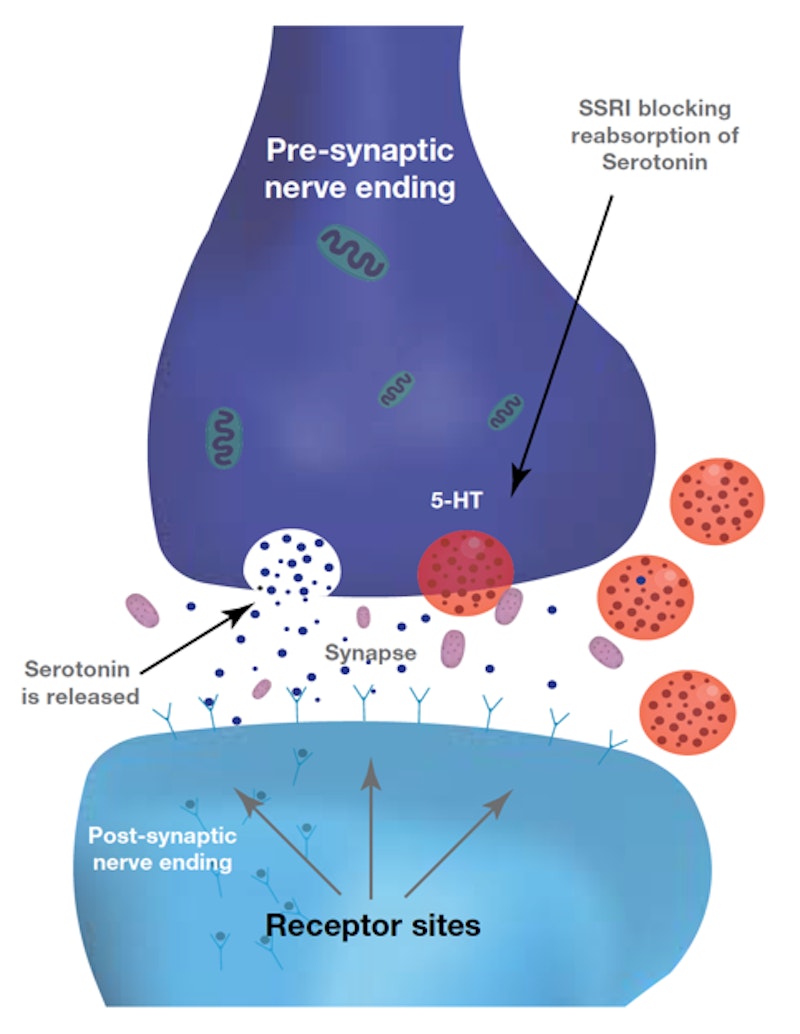Study Notes
Treating OCD
- Level:
- AS, A-Level
- Board:
- AQA, Edexcel, OCR, IB
Last updated 22 Mar 2021
In this study note we evaluate biological treatments for OCD, specifically two drug treatments: (1) anti-depressants and (2) anti-anxiety drugs.
Biological treatments for OCD aim to restore biological imbalances, such as too little serotonin. Drug treatments are based on the assumption that chemical imbalances are the main cause of the problem. Two types of drug are used for the treatment of OCD: (1) anti-depressants and (2) anti-anxiety drugs.
Anti-depressant drugs
The biological explanation suggests that OCD (and depression) is the result of low levels of the serotonin in the brain. SSRIs (selective serotonin re-uptake inhibitors) are one type of anti-depressant drug, which include drugs like Prozac.
The diagram (below) illustrates how SSRIs work.
When serotonin is released from the pre-synaptic cell into the synapse, it travels to the receptor sites on the post-synaptic neuron. Serotonin which is not absorbed into the post-synaptic neuron is reabsorbed into the sending cell (the pre-synaptic neuron). SSRIs increase the level of serotonin available in the synapse by preventing it from being reabsorbed into the sending cell. This increases level of serotonin in the synapse and results in more serotonin being received by the receiving cell (post-synaptic neuron).
Anti-depressants (like anti-anxiety drugs) improve mood and reduce anxiety which is experienced by patients with OCD.

Anti-anxiety drugs
Benzodiazepines (BZs) are a range of anti-anxiety drugs, which include trade names like Valium and Diazepam.
BZs work by enhancing the action of the neurotransmitter GABA (gamma-aminobutyric acid).
GABA tells neurons in the brain to ‘slow down’ and ‘stop firing’ and around 40% of the neurons in the brain respond to GABA. This means that BZs have a general quietening influence on the brain and consequently reduce anxiety, which is experienced as a result of the obsessive thoughts.
Evaluation
One strength of biological treatments for OCD comes from research support which uses randomised drug trials. These trials compare the effectiveness of SSRIs and placebos (a ‘drug’ with no pharmacological value).
Soomro et al. (2008) conducted a review of the research examining the effectiveness of SSRIs and found that SSRIs were more effective than placebos in the treatment of OCD, in 17 different trials. This supports the use of biological treatments, especially SSRIs, for OCD.
Another strength of biological treatments is their cost. Biological treatments, including anti-depressants and anti-anxiety drugs, are relatively cost effective in comparison to psychological treatments, like cognitive behavioural therapy (CBT). Consequently, many doctors prefer the use of drugs over psychological treatments, as they are a cost effective solution for treating OCD (and depression), which is beneficial for health service providers.
Extension:
In addition, psychological treatments like CBT require a patient to be motivated. Drugs however are non-disruptive and can simply be taken until the symptoms subside. As a result, drugs are likely to be more successful for patients who lack motivation to complete intense psychological treatments.
However, one weakness of drug treatments for OCD is the possible side effects of drugs like SSRIs and BZs. Although evidence suggests that SSRIs are effective in treating OCD, some patients experience mild side effects like indigestion, while other might experience more serious side effects like hallucinations, erection problems and raised blood pressure. BZs are renowned for being highly addictive and can also cause increased aggression and long-term memory impairments. As a result, BZs are usually only prescribed for short-term treatment. Consequently, these side effect diminish the effectiveness of drug treatments, as patients will often stop taking medication if they experience these side effects.
Finally, drug treatments are criticised for treating the symptoms of the disorder and not the cause. Although SSRIs work by increasing the levels of serotonin in the brain, which reduces anxiety and alleviates the symptoms of OCD, it does not treat the underlying cause of OCD. Furthermore, once a patient stops taking the drug, they are prone to relapse, suggesting that psychological treatments may be more effective, as a long-term solution.
You might also like
Misleading Information – Post-event Discussion
Study Notes
Anxiety
Study Notes

OCD - Shared Experiences
29th March 2016
Aggression: Evaluating Genetic Factors
Study Notes
Mental Health Mates: Walking Your Way to Sanity
14th January 2017
Memory - "Connection Wall" activity
Quizzes & Activities
Models of Memory - "Lockdown" activity
Quizzes & Activities